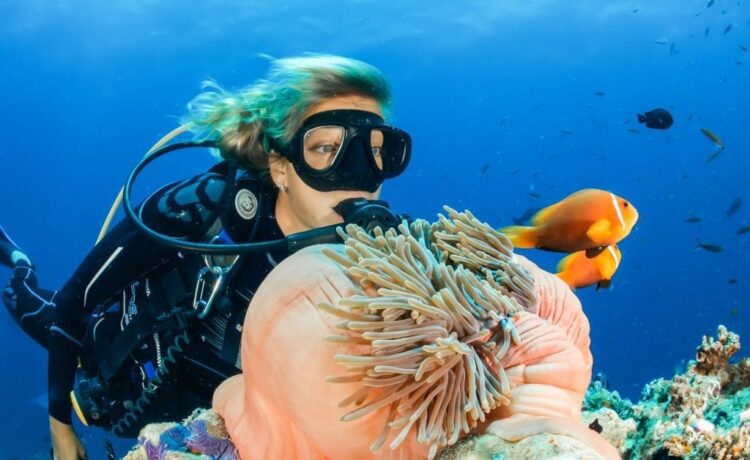SCUBA Diving is a form of scuba diving. You should be familiar with the fundamentals of SCUBA diving.
The allure of the unreachable and enigmatic undersea environment is the main reason for scuba diving. The ocean has been the “area” of existence that mankind has not been able to fully monitor since the dawn of time; we simply aren’t capable of breathing underwater on our own. As a result, scuba diving allows us to immerse ourselves in the environment, even if only for a short period of time.
Scuba stands for Self-Contained Underwater Breathing Apparatus, which means that we need to use special devices to breathe underwater.
Basic scuba diving equipment
One or two gas cylinders are attached to the diver’s back in typical scuba diving equipment. This gas tank is connected to an air hose and a demand or diving valve, which regulates the flow of air so that the air pressure in the diver’s lungs matches the water pressure. The buoyancy control system (BCD), which is actually an inflatable jacket that controls your buoyancy by inserting or removing air, is one of the other pieces of diving Hurghada equipment.
The air in such tanks is compressed air, as we know it from outside: nitrogen, oxygen, and maybe other gases. People often wrongly assume that the air in the tanks is pure oxygen, which can be toxic to the divers. Divers must maintain strict vigilance while diving to greater depths due to the nitrogen in the compressed air, as nitrogen narcosis, which has the same impact as excessive alcohol, can occur. This can be quickly determined by returning to deeper open water spots.
Scuba diving is a sport that you should learn to do
It is really very easy to learn to scuba dive. In reality, everyone could learn the basic skills required to breathe and travel underwater in 15 minutes. Not only can you hear about swimming during the professional course, but you can also learn how to use the scuba equipment. During immersions, you must also learn how to avoid and fix problems.
Your teacher will walk you through the basic equipment you’ll need for your ocean or open-water cenote dive, as well as the basic skills you’ll need to feel safe and comfortable when SCUBA diving on your own.You will then enter the water for the first time in our pool or shallow water location and get a sense of how quick and soothing breathing underwater is. You will see amazing and magical underwater life that you never knew existed at this stage, and you will begin to understand why scuba diving fascinates everyone involved. After the dive, your instructor will assist you with recognizing and labeling all of the tropical sea life you met.
Scuba diving is a perfect place to get some exercise
Scuba diving’s key advantages to overall physical health were recognized by, which compared it to metabolic activities such as ice hockey, speed walking, and recreational soccer, to name a few. A man weighing 180 pounds (81.6 kg) will burn up to 600 calories in an hour of diving, and even more if swimming in heavy waters or cold water.
Scuba diving workouts are beneficial not just for physical fitness but also for mental and emotional well-being. The underwater world’s quiet, harmony, and beauty, as well as its wildlife, inspire optimism and provide genuine joy to those who encounter them. Diving is an ideal way to improve and tone the body, lose calories, and raise serotonin levels, making it a rewarding and pleasurable way to remain healthy and satisfied.
Scuba diving health and medical standards
Before starting a scuba diving Hurghada course, all students must fill out a medical form. The high pressure a diver encounters underwater has a host of implications on how his body works. Physical conditions that aren’t bothersome or even noticeable in daily life can be deadly underwater.
Underwater, lung conditions (such as asthma), ear problems, allergies, and some infections can all be harmful. Any drugs should not be taken when swimming. People who want to dive should read the diving medical questionnaire carefully and sincerely before beginning the curriculum, and they should revisit it regularly during their diving careers.

